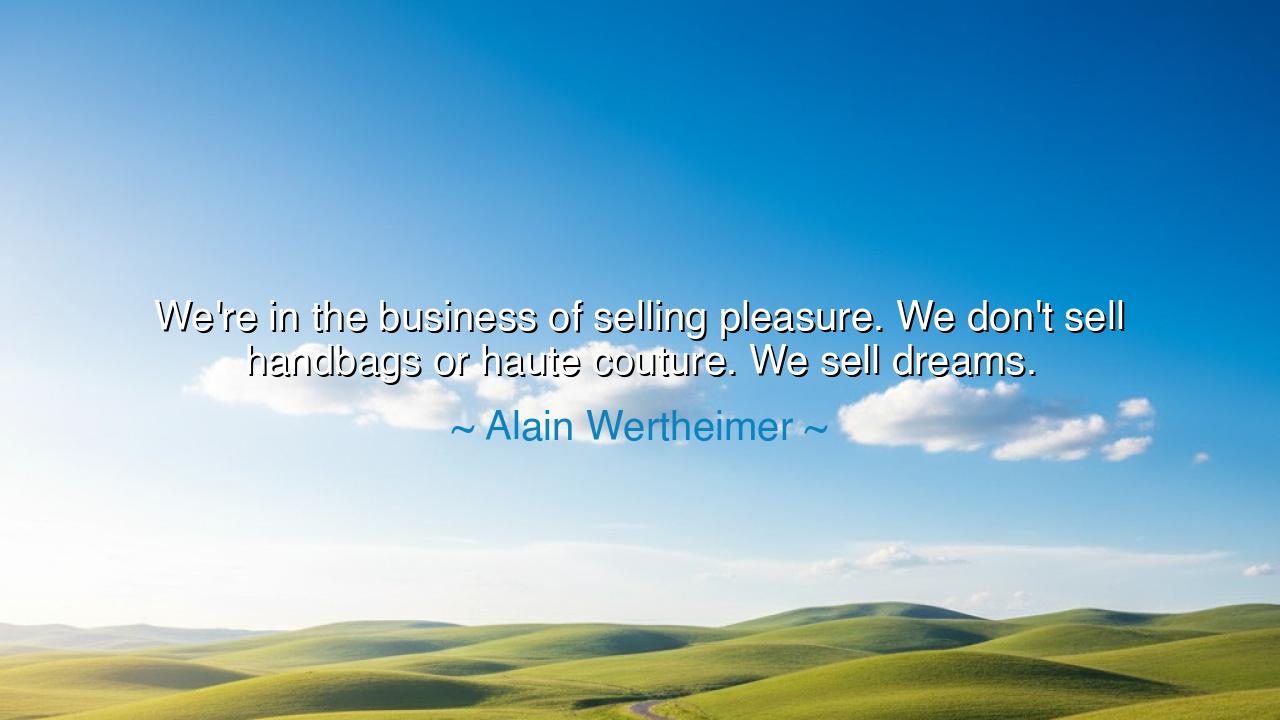
We're in the business of selling pleasure. We don't sell handbags
We're in the business of selling pleasure. We don't sell handbags or haute couture. We sell dreams.






In this exquisite and revealing declaration, Alain Wertheimer, the co-owner and guardian of the legendary House of Chanel, unveils the true soul of luxury and artistry: “We’re in the business of selling pleasure. We don’t sell handbags or haute couture. We sell dreams.” These words shimmer with more than commercial wisdom; they speak to the essence of human longing — the ancient desire to transcend the ordinary and touch the realm of beauty, identity, and imagination. Wertheimer, a man who has preserved one of the world’s most iconic brands, reminds us that the power of creation lies not in the object itself, but in the emotion it awakens.
The origin of this quote emerges from the philosophy that built Chanel into a cultural phenomenon. Founded by the visionary Gabrielle “Coco” Chanel, the brand was never simply about clothing or perfume — it was about liberation, confidence, and the expression of self. Wertheimer, heir to that vision, understood that to keep Chanel alive was not to mass-produce fashion, but to nurture a dream. To him, every product — from a handbag to a fragrance — is a vessel carrying the deeper essence of pleasure, a feeling that stirs the heart, transcends need, and touches the imagination.
To say “we sell dreams” is to recognize that human beings do not live by necessity alone. Once the body is fed and clothed, the soul hungers for meaning, beauty, and wonder. Wertheimer’s words echo the wisdom of the ancients, who knew that art and adornment were not mere vanity, but a celebration of life itself. The pleasure he speaks of is not shallow indulgence; it is the joy of identity, the delight of becoming more than what we are. In this way, Chanel — and all art that aspires to timelessness — does not sell material possessions, but states of being: elegance, confidence, allure, and freedom.
Consider the story of Coco Chanel herself, a woman born into poverty, orphaned young, and raised in hardship. From such beginnings, she rose to redefine femininity in an age that confined women in corsets and constraint. She dared to dream of simplicity and movement, of elegance that freed rather than bound. Her little black dress and her Chanel No. 5 perfume became emblems not of wealth, but of aspiration — of a dream that anyone, no matter their origin, could rise and reinvent themselves. In this light, Wertheimer’s statement is not mere marketing; it is the continuation of Chanel’s legacy of selling the dream of self-creation.
The idea of “selling dreams” reaches beyond fashion — it belongs to all who seek to inspire. The artist, the musician, the writer, the craftsman — each, in their own way, does not merely offer a product, but a reflection of human longing. When Leonardo da Vinci painted Mona Lisa, he did not sell paint or canvas — he sold mystery, serenity, and eternity. When Walt Disney built his world of fantasy, he was not selling amusement parks, but hope and imagination. Likewise, Wertheimer speaks for all creators when he says that true business — the business that endures — is not built on things, but on the feelings they evoke.
Yet there is a warning hidden in his words, as there always is in wisdom. To sell dreams is to carry a sacred responsibility. For the dream can uplift, but it can also deceive. The wise creator must ensure that what they offer is not empty illusion, but authentic beauty — the kind that enriches rather than corrupts. Wertheimer’s phrase, “We don’t sell handbags or haute couture,” reveals a humility that many forget: the object is nothing without the spirit it conveys. The great brands, like the great temples of art, endure only when they remember that their purpose is not profit, but pleasure born of truth — the joy of touching something eternal through the material world.
So, my child, take this lesson to heart: whatever your craft, whatever your calling, remember that the world does not hunger merely for things — it hungers for meaning. Whether you are a designer, a teacher, a writer, or a builder, you too are in the business of selling dreams. The work of your hands must awaken something in others — a spark, a memory, a hope. Do not settle for creating what is useful; create what is beautiful, what is felt, what uplifts the spirit.
For in the end, as Alain Wertheimer teaches, the truest success lies not in wealth, but in the ability to make others feel alive. To sell dreams is to serve humanity’s oldest desire — to reach for the stars while standing on the earth. When your work brings light to others, when it gives them a glimpse of what they could be, you will know that you, too, have joined the timeless brotherhood of creators — those who do not merely make things, but shape the dreams through which the world remembers its soul.






AAdministratorAdministrator
Welcome, honored guests. Please leave a comment, we will respond soon